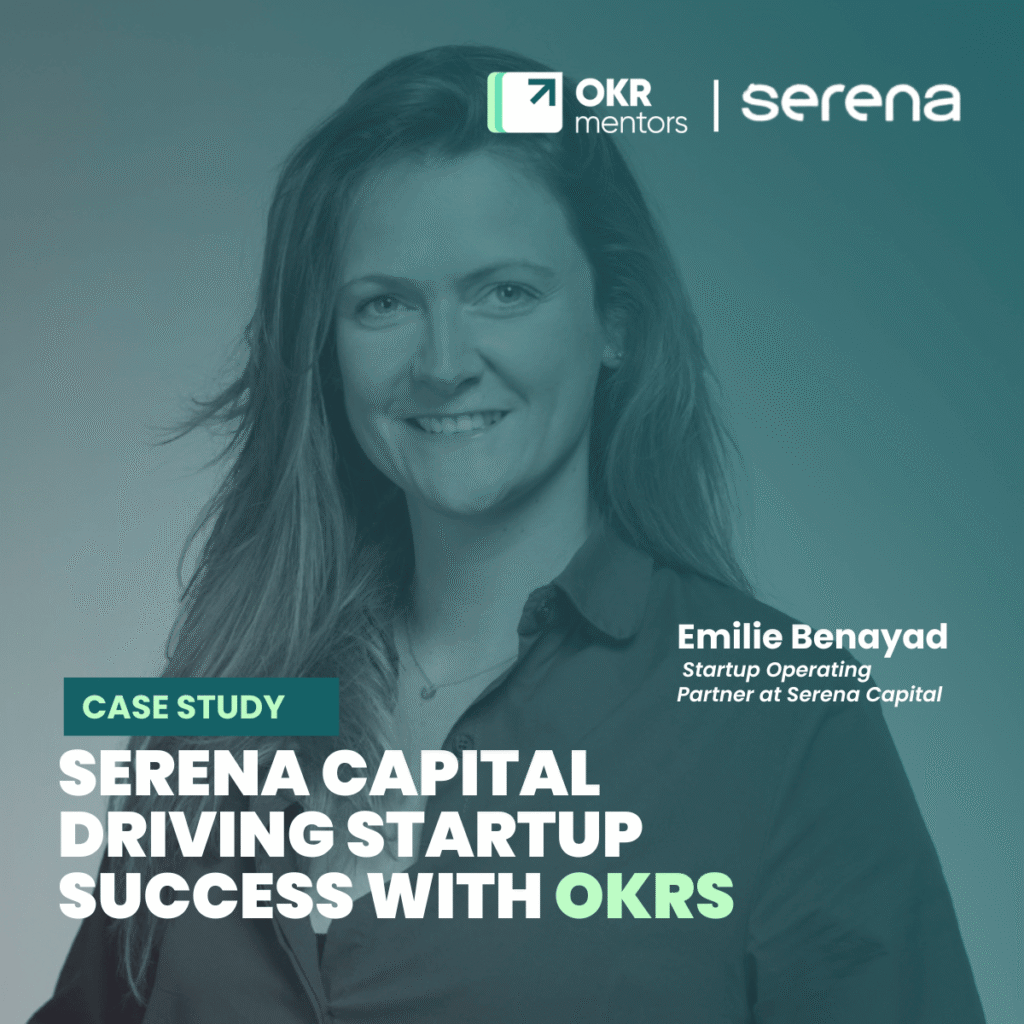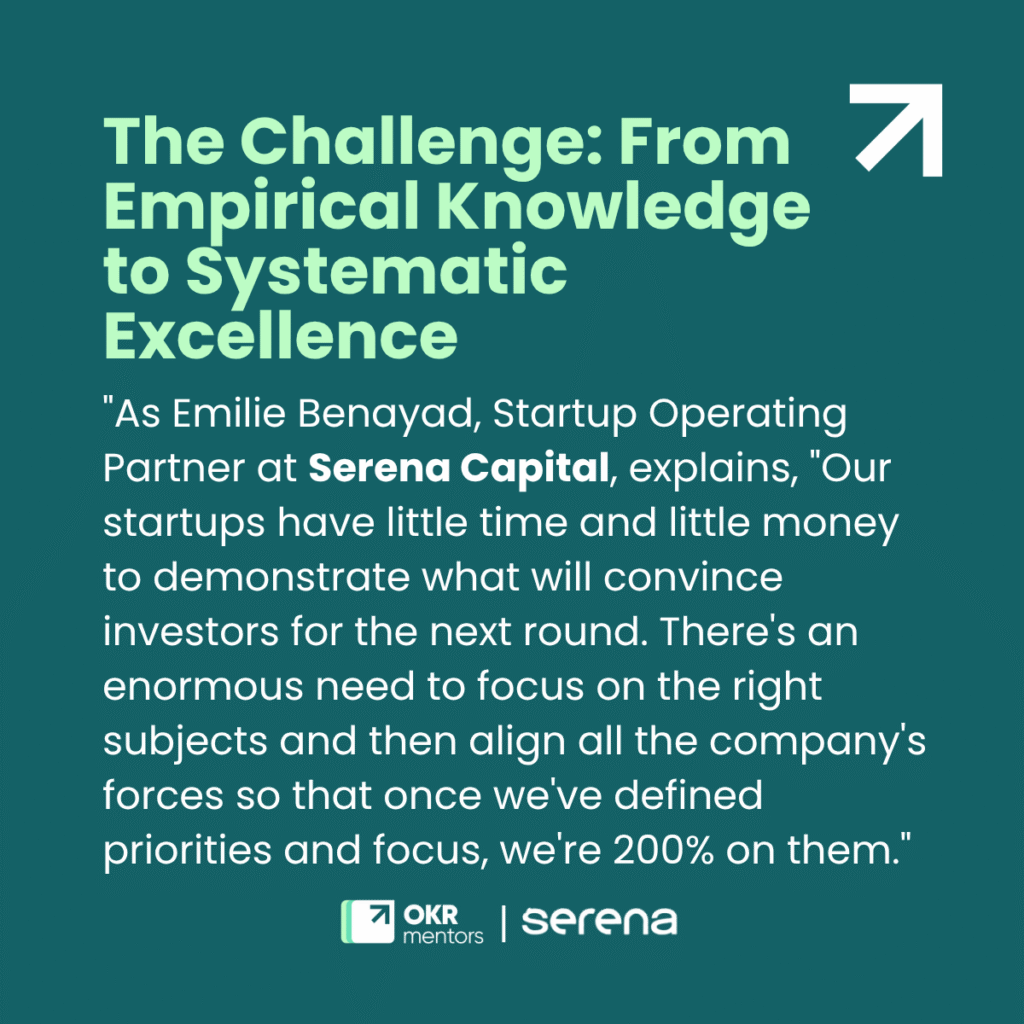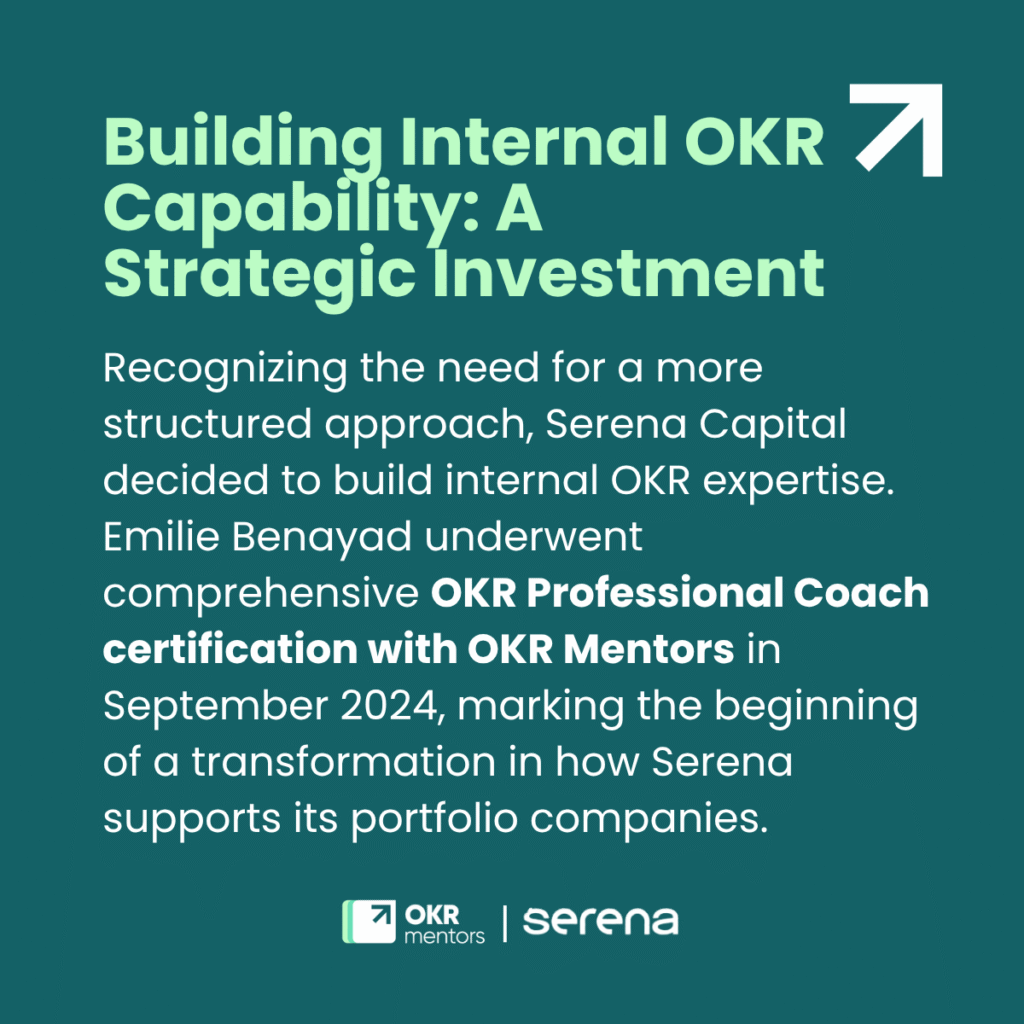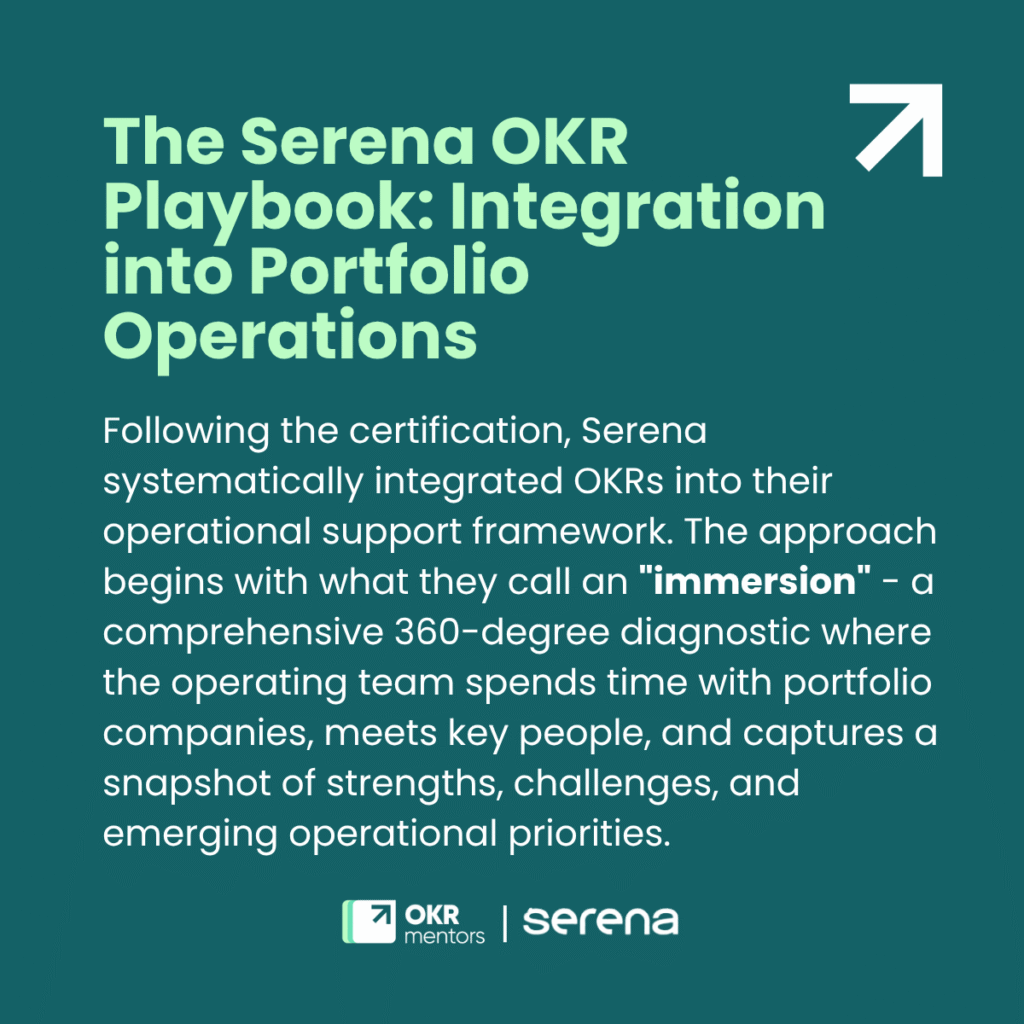When venture capital firms invest in startups, they’re betting on more than just financial returns – they’re investing in execution capability. For Serena Capital, a leading European VC firm managing multiple funds across tech verticals, this meant finding a systematic way to help their portfolio companies focus, align, and deliver results with limited time and resources.
Enter the Objectives and Key Results (OKR) methodology – a framework that Serena has integrated into their operational playbook to drive portfolio success. This case study explores how Serena Capital partnered with OKR Mentors to build internal OKR expertise and deploy it across their investment portfolio, transforming how they deliver value beyond capital.

The Challenge: From Empirical Knowledge to Systematic Excellence
As Emilie Benayad, Startup Operating Partner at Serena Capital, explains, “Our startups have little time and little money to demonstrate what will convince investors for the next round. There’s an enormous need to focus on the right subjects and then align all the company’s forces so that once we’ve defined priorities and focus, we’re 200% on them.”
Before September 2024, Serena’s operating partners – all former entrepreneurs or C – C-level executives – relied on their empirical knowledge of goal-setting frameworks. While valuable, this approach lacked the precision and pedagogical clarity needed to systematically help portfolio companies avoid common execution pitfalls.
The most frequent challenges Emilie Benayad observed across the portfolio included:
- Too many objectives running simultaneously, diluting focus
- Priorities changing every two weeks, preventing teams from exploring ideas thoroughly
- Misaligned efforts as companies grew beyond 15 employees, with founders discovering team members working on unrelated initiatives


Building Internal OKR Capability: A Strategic Investment
Recognizing the need for a more structured approach, Serena Capital decided to build internal OKR expertise. Emilie Benayad underwent comprehensive OKR Professional Coach certification with OKR Mentors in September 2024, marking the beginning of a transformation in how Serena supports its portfolio companies.
“The training allowed me to have a very clear method, quite ready to use, that I can deploy with processes and tools that are also somewhat ready to use,” Emilie Benayad reflects. “This enables us to be much more effective in the support we provide to startups today.”

The Serena OKR Playbook: Integration into Portfolio Operations
Following the certification, Serena systematically integrated OKRs into their operational support framework. The approach begins with what they call an “immersion” – a comprehensive 360-degree diagnostic where the operating team spends time with portfolio companies, meets key people, and captures a snapshot of strengths, challenges, and emerging operational priorities.
“Following this immersion, implementing OKRs – when not already in place – now almost systematically becomes part of our recommendations and topics we work on with the company,” Emilie Benayad explains.
The new playbook positions Emilie Benayad as the OKR reference point within Serena. When other operating partners identify the need for better strategic execution in their portfolio companies, they direct them to work with her on OKR implementation.

Early Success Stories: From Theory to Practice
Within six months of launching their enhanced OKR capability, Serena began seeing tangible results across their portfolio:
Implicity: A Structured Pilot
Emilie Benayad’s first full deployment involved accompanying a portfolio company through a complete OKR cycle. Working in tandem with an internal OKR lead she trained, they navigated the entire process together, ensuring the company could sustain the practice independently after her involvement.
“I followed them throughout the entire cycle, and it went well. They seemed very satisfied,” Emilie Benayad notes. The success of this pilot validated the approach and built confidence for broader deployment.
Scaling Success Across the Portfolio
Word of the successful implementations spread quickly. “I’ve been solicited by other portfolio companies on these topics, and I have another company that I’ll support in an initial meeting next week,” Emilie Benayad shares, highlighting the organic demand for OKR expertise within the portfolio.
The Serena OKR Journey: Leading by Example
In a bold move to fully understand and model the OKR process, Serena Capital launched OKRs internally for the first time in 2025. This initiative, led by Emilie Benayad as OKR Lead with the executive committee serving as sponsors, demonstrates the firm’s commitment to the methodology.
The internal deployment revealed practical insights about adaptation and governance:
- Creation of “KR Leads” – a role not typically found in standard OKR methodology – to distribute ownership across seven key results
- Monthly check-in cadence instead of bi-weekly, respecting the organization’s culture while maintaining momentum
- Focus on maintaining momentum over perfection, prioritizing quick closure of planning phases to preserve team energy
Key Learnings: What Startups Really Need
Through her work with portfolio companies, Emilie Benayad has identified distinct patterns in how startups approach OKRs:
For startups already using goal-setting frameworks: “What they come looking for initially is reassurance – ‘here’s what I’ve done, what do you think?’ What’s good, what’s not good, what should I do differently?”
For OKR – hesitant startups: Some have heard horror stories about OKRs becoming “too complex” or “a factory of processes.” Others believe they’re still too early-stage to benefit from structured goal-setting – a misconception Emilie Benayad actively challenges.
The transformative impact of OKRs addresses three critical issues:
- Forcing choices: “OKRs push you to choose and therefore give up, at least for a given period”
- Stabilizing execution: “Even with a short time horizon, generally the shortest is three months… it forces you to define an action plan you’ll stick to”
- Creating alignment: “It allows everyone’s actions to be inscribed in a direction recognized by all”


Partnership with OKR Mentors: Beyond Training
When asked about choosing OKR Mentors, Emilie Benayad highlights the comprehensive support that extends beyond initial training. “The training is really designed to make you as autonomous as possible to launch yourself. That doesn’t mean you won’t make mistakes. But you feel well-equipped to launch post-training.”
The ongoing relationship with Elie Casamitjana, CEO of OKR Mentors and the wider community, has proven invaluable. “Outside of training, when I’ve had questions or doubts, OKR Mentors team and community has always been available to answer my questions in an ad hoc manner. That’s also very appreciable,” Emilie Benayad notes.
Looking Forward: Scaling Impact
Serena Capital’s OKR journey represents more than just another tool in their operational toolkit – it’s a fundamental shift in how they deliver value to portfolio companies. By building internal expertise and systematically deploying OKRs across their portfolio, they’re addressing the core challenge every startup faces: executing with focus and alignment when resources are scarce.
As Emilie Benayad concludes, “I would recommend it without hesitation” to other operating partners, advisors, and consultants, as well as to companies that have reached a size where having internally trained people who carry the know-how can instill this methodology into their culture.
The partnership between Serena Capital and OKR Mentors demonstrates how venture capital firms can move beyond financial investment to become true operational partners, equipped with proven methodologies that drive portfolio success.

